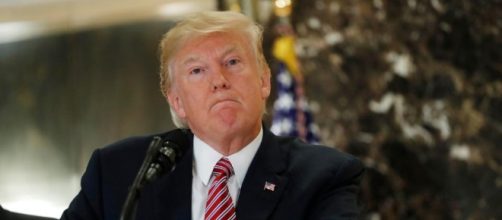President Donald Trump, whose travel ban against immigrants to the United States was described as "bigoted," blamed "both sides" for the tragic events that unfolded in Charlottesville, Va. over the weekend in an appearance before the media on Tuesday in front of Trump Tower. Those events, which centered around a racist rally by white supremacists and counter-protesters who were there to protest against bigotry, racism and neo-Nazi followers, resulted in the murder of a young, 32-year-old female counter protester, Heather Heyer, and the crash of a police helicopter that killed two Virginia state troopers.
The suspect, James Alex Fields, Jr., 20, of Maumee, Ohio, ran over Heyer with his car and then fled the scene.
Assessing the blame
Trump, whose original purpose for appearing before reporters only was to discuss infrastructure measures that he was undertaking, quickly and inadvertently got mired in a fast-moving press conference. When asked to whom he assessed the blame for the triple tragedies in Charlottesville, "the Donald" refused to commit himself to blaming the white supremacists who were instigating the violence exclusively. Instead, the President chose to run down the middle line and blame both sides for the violence and tragedies that took place. Trump said that "both sides," (white supremacists and the counter-protesters), were to blame for what transpired in Charlottesville.
Mr. Trump stated that there were "bad people" on both sides. He described Fields as a "murderer;" but he also stated that that, “You had many people in that group other than neo-Nazis and white nationalists,” according to the Huffington Post on Tuesday.
Trump then turned his attention to the counter-protesters, describing them as a "group on the other side that came charging in without a permit and they were very, very violent," (Huffington Post, Tuesday). Trump then emphatically blame both sides, stating: “I think there is blame on both sides. You look at both sides,” (Huffington Post, Tuesday).
Trump contradicts himself
Trump's remarks on Tuesday directly contradicted his comments about the Charlottesville tragedies that he made on Monday.
On Monday, Trump blamed for the violence on white nationalists and neo-Nazi groups. However, the President's remarks on Tuesday closely echoed the remarks he made on Saturday, right after the violent outbreak occurred. In his Saturday comments, Trump suggested that both sides had people who had instigated the violence and without mentioning the white nationalists or neo-Nazi groups by name, he described the tragic events as "unacceptable." And, as previously mentioned, on Tuesday Trump put the blame on both sides, and stated that both sides had "bad people."
'Blood on his hands'
Meanwhile, Charlottesville Mayor Michael Signer firmly alleged on CNN on Sunday that Trump "has blood on his hands," according to the Huffington Post on Sunday.
Signer continued, explaining that Trump's rhetoric during the campaign and his actions as President have created a climate in the country that lends itself to white supremacist groups and to violence against those who do not fall into the demographic that white supremacists, white nationalists, and neo-Nazis consider acceptable. Signer was suggesting that this climate that Trump has created led to the violence in Charlottesville over the weekend, and that consequently, Trump "has blood on his hands."
'Biggest wineries' of the world
When asked if he would visit Charlottesville to lend comfort to the grieving townspeople, Trump chose not to answer the question. Instead, the President extolled the fact that he owns a winery in Charlottesville, and described it as, "One of the largest wineries in the world," (Huffington Post on Tuesday). Merlot or Cabernet Sauvignon, Mr. President; or do you prefer white wines?


